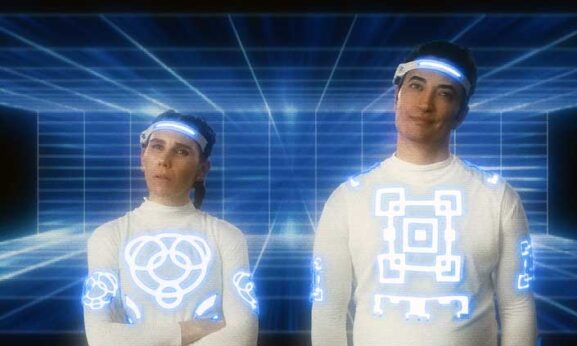
Two new science fiction works, one for the small screen and one for the large, provide new views of women. Each suggests different socio-political changes. Both measure the differences from the past.
Molli and Max in the Future rides in on its sharp, hip, modern sarcastic dialogue, greatly abetted by Alex Winkler’s well-paced light jazz score and its often cheesy, humorous CGI atmosphere. The film is a romantic comedy, a bit similar to, but light years ahead of When Harry Met Sally. Its clichés belong to the future, not the too-cute past.
Molli (Zosia Mamet) is a saber-tongued, yet spiritual crystal hunter whose illegal interplanetary mining foray is bumped off course when fighting robot engineer Max (Aristotle Athari) crashes into her. Because his vehicle is now collision-disabled, Max persuades Molli to chauffeur him to the extremely vertical Megalopolis, then to his native planet.
On this journey, we learn much about this unlikely pairing. They are quite different in approaches to life, as well as points of origin. Molli is the city dweller seeking escape. Max yearns for success in the city, though living remotely on the rocky Oceanus. His aspirations push aspersions deriding his home. “You can’t spell Oceanus without an anus!” Max seeks to cash in on his technical skills in every way possible. The more idealistic Molli is an adherent of a complex hierarchy of gods and witches. She’s more interested in self-development than profit.
But it is clear from their earliest clever, cutting verbal jousts that they find each other attractive intellectually and physically. As Molli says, “We’re totally not compatible. But that can make for great sex!”
The film’s 90 minutes are stuffed with social and political observations rooted in current progressive proclivities and themes projected out into time and space. As they travel 12 years, four planets, three dimensions, and one space cult through the movie’s course, their identities become well established. Their mutual destination is never in doubt.
Writer-director Michael Lukk Litwak keeps the film paced at the warp speed of its two principals. Both manage to be winningly vulnerable even as they rip through often caustic verbal riffs.
Mamet’s facility with dialogue may be inherited from her father, Pulitzer Prize-winning playwright, filmmaker and author David Mamet (Glengarry Glen Ross, Speed-the-Plow, American Buffalo, Spanish Prisoner, House of Games).
Fortunately, Zosia expresses a different stance than her father, who over the past 15 years has undergone an abrasive conversion to right-wing, Republican, anti-gun control, extreme pro-Israel, Trumpian election denialism. Zosia, at least in the film and through countless interviews, appears highly critical of contemporary social bankruptcy, resonating instead to idealistic crusades, feminism, and more liberal positions.
Rashida Jones of the golden pen
Like Zosia Mamet, Rashida Jones, the star of Sunny, was born with a golden pen in her hand. Her father, Quincy Jones III, now 91 years old, the grandson of slaves, has worked for over 70 years in the entertainment industry. Revered winner of a “Legendary Grammy Award” in 1992, one of 28 Grammy Awards in 80 nominations, Quincy Jones has been a songwriter, composer, arranger, and producer in both film and television, working with everyone from Count Basie and Sinatra to Michael Jackson and the ensemble of “We Are the World.” Time magazine names him one of the most influential jazz musicians of the 20th century.
As a writer, actor, director, and producer herself, his daughter Rashida stepped out onto broad shoulders. She earned her place in the industry, however, on her own merits. She started her diverse career in the television drama Boston Public, proceeded to the comedy Angie Tribeca, cowrote Celeste and Jesse Forever and Toy Story 4, in which she also appears. She wrote, produced, and directed the award-winning documentary Quincy about her father’s life in music.

Meanwhile, Rashida Jones has continued to appear in a host of movies and television programs, of which Sunny, a mystery unfolding in the near future, is the most recent. Jones is joined in the series by Hidetoshi Nishijima (Drive My Car) as her deceased husband Masa, and veteran Chinese actress Judy Ongg as Masa’s very textured mother. Voice actress Joanna Sotomura captures the spirit of robotic helper Sunny herself.
Together they weave an atmosphere of mystery, social mores, futuristic fears, and deep-felt melancholy seasoned with wry humor as they examine social issues.
What is the role of the machines we have created to order and convenience our daily lives in the new and future world? Do these creations help or impede? Who controls whom? Are they a threat? Will Jones’ deft Everywoman struggling to cope with personal tragedy and cross-cultural anxiety find understanding, happiness and resolution?
Sunny and Molli and Max in the Future ultimately provide us with more than just entertainment. They preview and predict our entrée into the brave new world that awaits us.
Molli and Max in the Future is available live streaming on Prime TV. The trailer can be seen here.
Sunny is available live streaming on Apple TV. The trailer is here.










